|
|
|
Sort Order |
|
|
|
Items / Page
|
|
|
|
|
|
|
| Srl | Item |
| 1 |
ID:
094082
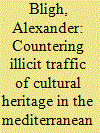

|
|
|
|
|
| Publication |
2010.
|
| Summary/Abstract |
Some of the most thrilling movies of all time depict imaginary or real thefts of artifacts from well-known museums. Topkapi (1964) is about the theft of the Ottoman Sultan's jewel-encrusted dagger from the Istanbul Museum; Entrapment (1999) is about the world's greatest art thief and his plans for the theft of a highly secured piece of artwork. More realistically, most people tend to turn to a news report on art stolen or recovered before they read their usual daily dose of hard news. Art and artifacts definitely capture the collective imagination. Art is usually viewed as the better dimension of human personality, while art thieves often enjoy a degree of infamy not usually associated with other kinds of felonies.
|
|
|
|
|
|
|
|
|
|
|
|
|
|
|
|
| 2 |
ID:
139384
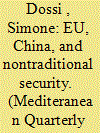

|
|
|
|
|
| Summary/Abstract |
As political instability challenges China’s growing interests in the Mediterranean region, the European Union might prove to be the right partner for Beijing. This essay assesses the prospects for EU-Chinese security cooperation in the region. A shared doctrinal concern with nontraditional security provides a solid foundation, as proved by antipiracy efforts in the Gulf of Aden. This paves the way for nontraditional security cooperation in the Mediterranean region, for instance in the field of noncombatant evacuation. Yet a crucial precondition is that the EU behaves more coherently, in order to be perceived by China as a reliable partner.
|
|
|
|
|
|
|
|
|
|
|
|
|
|
|
|
| 3 |
ID:
095182


|
|
|
|
|
| Publication |
2010.
|
| Summary/Abstract |
The literature on governance has recently witnessed a growing tension between a techno-managerial account of governance and a power-sensitive approach. This article argues that the downgrading of power relations by the techno-managerial approach is significantly problematic and counterproductive. Building on the case of the Euro-Mediterranean Development Bank, the article shows how the EU's articulation of the techno-managerial approach has had serious negative implications. On the one hand, it re-emphasised the embedded long-term power asymmetries that have characterised the EU's general governance attitude relationship with its Mediterranean partners. On the other hand, it compromised the credibility of EU policies in addressing and pressing for further reforms in the Mediterranean region.
|
|
|
|
|
|
|
|
|
|
|
|
|
|
|
|
| 4 |
ID:
139374
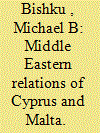

|
|
|
|
|
| Summary/Abstract |
Cyprus and Malta are small Mediterranean states located on the periphery of Europe that have had unusual political affiliations following independence from Great Britain in 1960 and 1964, respectively. Historically and culturally they have had Middle Eastern connections. Cyprus was the scene of Arab settlement and later Ottoman rule, and today one-fifth of the population is Muslim Turkish, while the rest is predominantly Greek Orthodox. Malta was under direct Arab rule and its language is Semitic in origin, although its population today is almost exclusively Roman Catholic. Both countries used membership in the Non-Aligned Movement and later their connections with the European Union to gain leverage in foreign relations with more powerful states, especially in matters involving the Mediterranean region. During the Cold War and its aftermath, their ties with Middle Eastern neighbors have also brought economic benefits and a greater sense of security without their having to join military alliances.
|
|
|
|
|
|
|
|
|
|
|
|
|
|
|
|
| 5 |
ID:
130532


|
|
|
|
|
| Publication |
2014.
|
| Summary/Abstract |
The long-standing Cyprus question is deeply influenced and shaped by the complex political and geostrategic environment of the broader Mediterranean region. In addition, Cyprus is key to European and Western power and influence in the greater Middle East and of increasing interest for energy extraction and transportation to markets. This essay lays out the interests of major regional players, including Europe, the United States, Greece, and Turkey, and their impact on Cyprus. Furthermore, it explains how Cyprus figures in the emerging regional energy extraction and transportation arrangements currently being developed by several actors in the region. The author argues that this multifaceted strategic environment must be taken into account in order to find a sustainable way forward on resolving the Cyprus question.
|
|
|
|
|
|
|
|
|
|
|
|
|
|
|
|
| 6 |
ID:
176461


|
|
|
| 7 |
ID:
163644
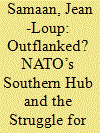

|
|
|
|
|
| Summary/Abstract |
Following the rise of the Islamic State in 2014, the Atlantic Alliance engaged in an ambitious political revision of its policies towards the Middle East, which led to the creation of the NATO Strategic Direction South Hub. However, this new policy was only marginally the product of a threat-driven strategy; rather it was the result of two factors. Specifically, it responded to a political need in NATO Headquarters and the capitals of member states, particularly in Southern Europe countries, to acknowledge the latest security challenges in the Middle East and to offer a policy more balanced between NATO missions to the East, namely vis-à-vis Russia’s policies in its neighbourhood, and those in the South. The Hub also provided the Joint Forces Command – Naples with a strong mission within the NATO bureaucracy. Nevertheless, the limitations of the project with respect to the Alliance’s other political priorities indicate that this institutionalisation of a new organisation within NATO did not overcome the ambiguities of the Alliance’s posture towards the region, but rather reflected them.
|
|
|
|
|
|
|
|
|
|
|
|
|
|
|
|
| 8 |
ID:
073795


|
|
|
|
|
| Publication |
2006.
|
| Summary/Abstract |
As Israel's disengagement from the Gaza Strip unravels itself in front of the public, it is clear that this historic move may reignite the Road Map. President George W. Bush and his regional partners have high hopes of treading its muddy waters. But despite its "clear phases, timelines, target dates, and benchmarks aiming at progress through reciprocal steps by the two parties in the political, security, economic, humanitarian, and institution-building fields, under the auspices of the Quartet" intended to move it toward a settlement of the Israel-Palestinian conflict, the Road Map lacks the appropriate foundations and environment to cultivate the seeds of peace so that they actually grow. A broader, more effective solution might entail creating a comprehensive culture of peaceful coexistence through communication on a regional basis-the Mediterranean region.
|
|
|
|
|
|
|
|
|
|
|
|
|
|
|
|
| 9 |
ID:
131868
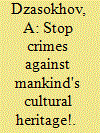

|
|
|
|
|
| Publication |
2014.
|
| Summary/Abstract |
Inter arma silent Musae (In times of war, the Muses are silent). This paraphrased ancient Latin maxim comes to mind now when the Middle East stretching from Libya to Iraq is in the grip of war. Its biblical regions, literally steeped in millennia of history and culture, are in the middle of a large-scale crisis caused by the 2003 aggression against Iraq and stoked by the so-called Arab Spring that started in 2011.
|
|
|
|
|
|
|
|
|
|
|
|
|
|
|
|
| 10 |
ID:
131620


|
|
|
|
|
|
|
|